
Panama
In 2018 my wife Elaine and I had the opportunity to travel to central Panama and participate in a medical mission trip with The NEVOSH group. NEVOSH stands for New England Volunteers in Optometric Service to Humanity. In addition to optometrists the group has grown to include medical doctors, nurses, dentists, pharmacists, audiologists, women health workers and now physical therapists and chiropractors.
In 2019 our son Dr. Alex Crellin joined us while still a student at Bridgeport University. Recently we just returned from our 3rd trip there. Each year brings new experiences, new friendships and of course, greater health to the Panamanians most in need. Although Panama is not the poorest country in Latin America, there are still profound needs for health care services.
Many people wait all year to have a tooth pulled,obtain a pair of glasses,be fitted for a hearing aid, have their diabetes assessed or in our case, have their aches and pains diagnosed and treated. They travel all night and are there lined up outside the facility at 8:00 AM Monday morning,at times the line are 200-300 people deep.
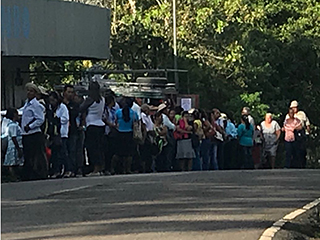
In the 4 days that The NEVOSH group are working 3,000 needy people were examined, diagnosed and treated. What a great feeling that is. All the services are totally free and when possible, follow up care is arranged.
What makes this all possible are the Rotarians of Dorado, Panama. They are volunteers who make the arrangements, get the word out to the people in the fields, mountains and distant valleys that the American doctors are coming.
Getting There
For Elaine and I the adventure starts with any early Saturday morning bus ride to Logan Airport to catch an 8:00 AM flight out of Boston to Panama City, Panama.
The trip is scheduled annually during the MLK week in January. We gather at the airport and wait for everyone to arrive. Although the majority of our group of health care providers are from Rhode Island, however, we also from Connecticut, Massachusetts, New York, Maine, Michigan, Missouri, North Carolina and California. The flight is a little over 4 hours. Once we've arrived at the airport in Panama we hop a bus that takes us to the city of Penonome. Our accommodations are modest, clean and comfortable.
In our suitcases we bring medications, vitamins, thousands of glasses, treatment tables, hearing aids (which are fitted and made on site), and dental supplies. Some things we are able to leave and that the Rotarians store for use the following year, but every year there is always a need for re-stocking. Organizing the supplies takes time and attention to detail. But they always get it done.
The Schedule
On Sunday we take a bus to the facility that will be our clinic and where most of the care will be given. Usually it's an elementary school. Transforming a school into a multi discipline medical clinic is quite the job.It takes several hours to remove the desks, clean the area and set up. Sunday night we gather as a group for dinner and talk of the week ahead.
Monday morning we take the 45 minute bus ride to the clinic. As we pull up, thereis a line, as far as the eye can see, of people waiting to be attended to our group of health care providers. Many of these people have traveled all night to be there. And then often they wait in line many more hours as the line can move very slowly.
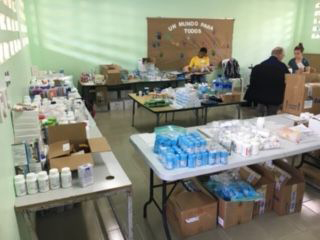
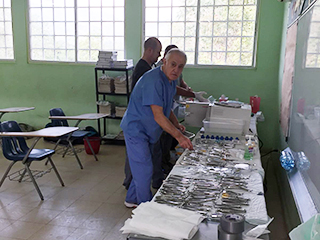
This year was particularly hot and humid. 85-90 degrees and air so thick you can lean on it. Ironically we are usually served boiling hot soup for lunch. It is always delicious so you eat it anyway, despite significantly increasing your core temp and the sweat on your brow. Plantains, yams, pork and rice are the mainstay of our lunch.
There is some kind of sweet flavored punch provided as well. The food is prepared and served by the Rotarians who take excellent care of us while we are there.We work pretty much non-stop for the 4 days. Usually we are getting back to the hotel around 6:00-6:30, and then out to dinner and right to bed.
Thursday night, the end of our work week, the Rotarians host a special dinner. We have a great party in celebration of another successful mission. The bartender hooks up a speaker and blasts Panamanian music as loud as the speaker can deliver. Soon a conga lined is formed. We worked hard and it feels good to dance and enjoy each other's company, despite how tired we may be.
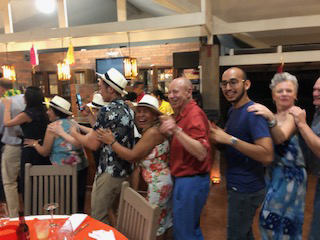
Friday morning, back on the bus, (we rent both the bus and a driver for the whole week as we all travel together to and from our accommodations and the temporary clinic) and head for couple days of R and R. On Sunday afternoon, we board the plane and are back in Boston Sunday night. And of course, we are back to work Monday morning.
The Rewards
There are many wonderful stories that come out of a week like this. Our first year, one story revolved around a 6 year old boy. He heard his mother's voice for the first time after being fitted for a hearing aid. There were many tears shed in that room that day. Grateful tears of joy.
People are now able to read, work, or see a loved one's face, all because they were able to get the right prescription glasses. Some arrived with awful dental conditions finally getting some attention. The medical doctors performed numerous procedures to eliminate many bothersome conditions as well as diagnosing and treating acute and chronic illnesses.
The facilities are very limited and there is no major surgery taking place. In fact most of the procedures are done on the teacher's desk with a towel on the surface and perhaps a sheet hung for privacy. But there is no complaining; only thank you's, no, I mean mil gracias.
NEVOSH is also a teaching organization. My son Alex went as a chiropractic student. He had hands on experience with more people that week than he did in a whole semester of school. As the week progressed, I could see clearly his abilities and confidence grow exponentially. There are also many dental, optometric, and nursing students getting experiences well beyond their academic years. The enthusiasm is contagious. In addition there is always a contingent of Panamanian medical students.
The medical doctors in the group are tremendously patient and take every opportunity to share an exciting case or a subtle nuance. It was thrilling to see the knowledge flow from one to the other. Most of the Panamanian medical students return year after year and we have formed many meaningful friendships. We all look forward to going the next year, when we will see them again and witness all at once the bounty of what a year's passing can bring.
Elaine and I are relative newcomers to The NEVOSH group. Dr. Carl Sakavitis (optometrist in Bristol, R.I.) and Dr. Rocco Robilotto (optometrist in Tarrytown, NY) are the leaders of the group and have been organizing and directing this trip for twenty plus years.
They are truly pros at pulling this off. There are so many problems that can happen, but they seemed to have most of them all worked out. In the past they have been to Nicaragua, El Salvador and Guatemala.
Some locations are more primitive, more challenging, than and maybe not as safe as, the environment we currently serve in Panama. In an effort to reach as many people as we can, there is often a satellite location where a small group travels by bus, inland, up the mountains to more remote areas. These people in need of care have no means to get to the coast to be seen so we must go to them.
Here in the states we see many injuries from motor vehicle accidents, repetitive lifting and slip and falls on ice. In Panama the causes of the injuries we see are a bit different then here in Rhode Island. Anatomy and physiology don't change at the border but stories behind their injuries do.
I didn't see one person who told me they sit all day and that's why their back hurts or that staring at a computer was causing their neck pain. Rather it's the field workers who suffer from overuse of their shoulder from swinging a machete 8-10 hours a day, the farm hands who end up on the wrong side of man vs. horse collision.
Or the degenerative knees from endlessly walking and carrying bundles up and down the omnipresent hills. Fortunately good chiropractic and physical therapy work travel well and Elaine and I were able to help many of these folks too.
Barriers to Care (2021-2026)
The people we see in Panama have little in terms of material goods. They are not starving, but they don't exactly have money in the bank. The elderly work until they can't work anymore and if they are lucky someone takes care of them at the end of their life. There is no social security and there is no extra money for saving. What they do have is a kind nature and a hardy work ethic.
They are proud, self-sufficient and complain very little. They travel long hours by bus and foot and somehow they remain clean and pressed. As someone who provides hand's on care to patients, I appreciate this fact more than you might know.
Most health care in Panama takes place in the cities. The rural folks do not have money to pay a physician. And the physicians usually don't live in places where they can't earn a living. So people in the mountains have to travel great distance to a city to be seen by a doctor. This arduous journey means follow-up care is the exception, not the rule.
Here in the states there are at times circumstances that may require some of us to travel inconvenient distance for our health care. But is not the barrier to care most of us experience here in the land of plenty. Rather high co-pays and deductibles come to mind. Insurance company's denying care for what many of us would consider arbitrary reasons. Providers not being in network, paperwork not properly filled out, always more and more hoops to jump through. Barriers are barriers. Good health care should be accessible to all. So there.
I first became interested in joining The NOVASH group for the adventure of it all. I return again and again because of the rewarding work and the bonds of friendship we have experienced with our fellow missionaries as well as the wonderful Panamanian people we have been privileged to serve.
This next year (2021) Elaine and I hope to expand our part of the program and to bring some orthopedic supplies with us. Often pain and disability can be alleviated with the simple introduction of a brace, crutch, a cane or a wheel chair.
We have fund raises throughout the year including a wine tasting, silent auction and a golf tournament. This helps pay for supplies and defrays costs for the students. If you would like to attend any of these functions, feel free to give me a call at 401-615-5200.
Below you will see some pictures from our trips. Included are patients, providers, interpreters, Panamanian medical students, Rotarians and a few farm animals.
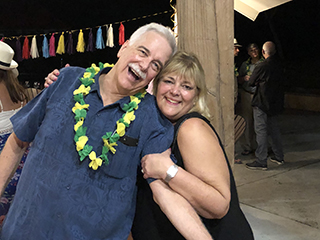
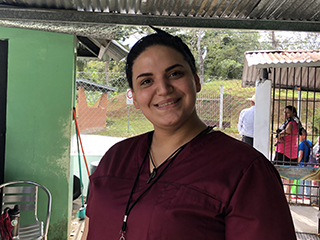
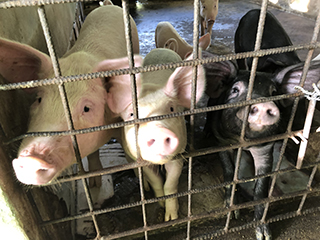
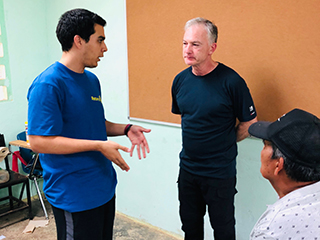
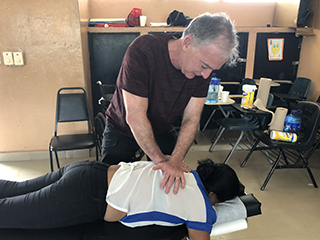
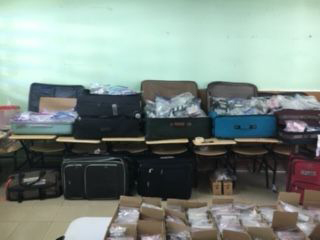
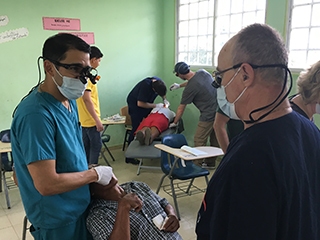
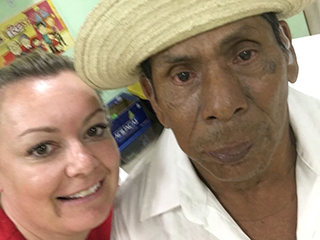
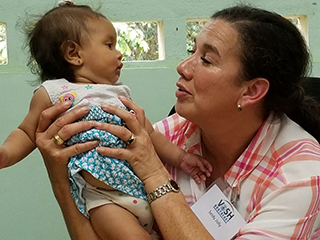
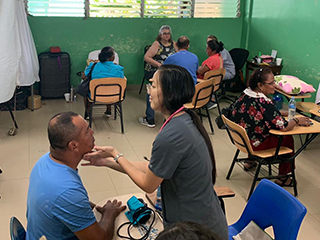
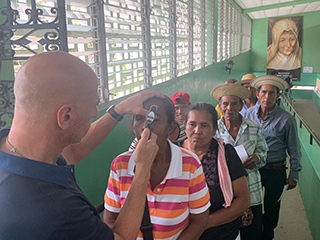
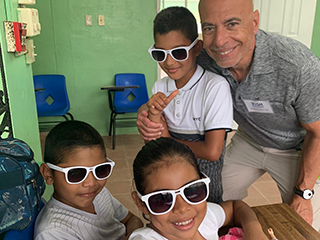
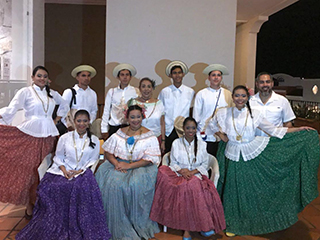
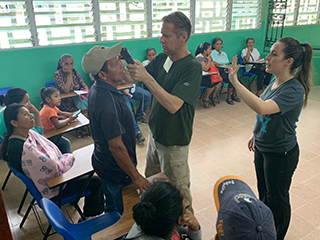
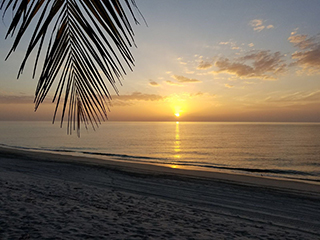
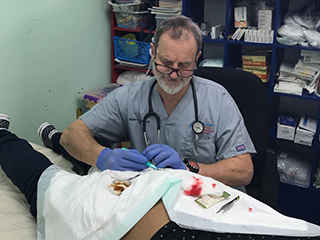
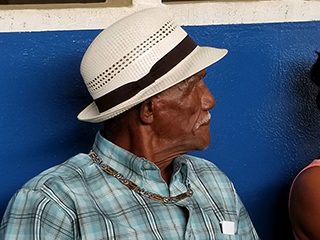
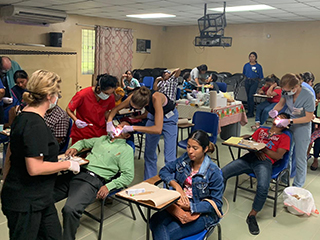
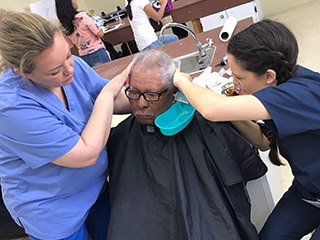
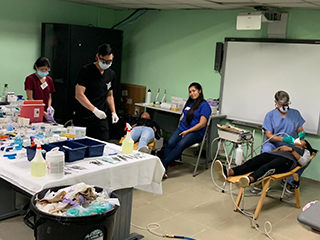
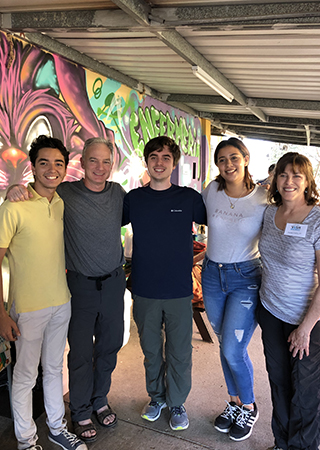
Dr Andrew Crellin, son Dr Alex Crellin and wife Elaine Crellin with 2 Panamanian medical students